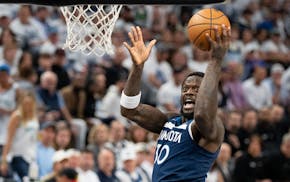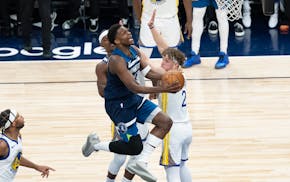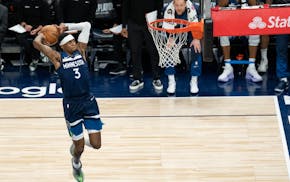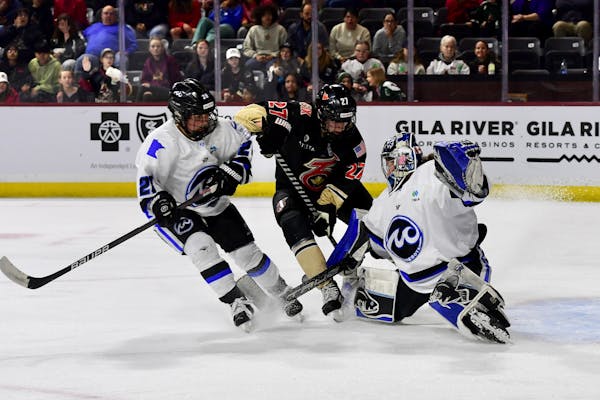A new women's professional hockey league was born Friday, when investors affiliated with the Professional Women's Hockey Players Association (PWHPA) bought the assets of a rival league. But it was unclear whether Minnesota will be part of it.
Leaders of the new league, which does not yet have a name, announced it will launch in January. Los Angeles Dodgers co-owner Mark Walter and his wife, Kimbra, will fund it, and tennis icon Billie Jean King is among the members of its governing board. The Walters bought the Premier Hockey Federation (PHF), whose seven teams include the Minnesota Whitecaps.
Friday's announcement did not say how many teams will be in the new league or where they will be located. Sports agent Brant Feldman, who represents several PWHPA players, confirmed there will be six teams — three in the U.S. and three in Canada — with expansion expected in the future.
Whitecaps founder Jack Brodt told the Star Tribune he "couldn't imagine there wouldn't be a team in Minnesota,'' given the state's strong fan base for women's hockey. But it's possible the teams could be clustered on the East Coast to keep travel costs in check, which could leave Minnesota out of the initial U.S. markets.
The Whitecaps, whose history dates to 2004, joined the PHF — formerly known as the National Women's Hockey League — in 2018 and won the league championship in 2019. They made the final last spring for the third time in four seasons.
For the past several years, women's professional hockey has been divided into two factions. Most members of the U.S. and Canadian national teams play with the PWHPA, formed in 2019. The NWHL began in 2015, changed its name to PHF in 2021 and has increased its salaries and sponsorships in recent years, raising its teams' salary cap to $1.5 million for 2023-24.
The announcement said the new league has spent months negotiating a collective bargaining agreement with the PWHPA. Contracts of PHF players, who were not unionized, have been voided.
The creation of a single new league was hailed by representatives of both the PWHPA and PHF as a landmark for the women's pro game.
"This effort is the most significant development in our game since women's ice hockey became an Olympic sport 25 years ago," PHF Commissioner Reagan Carey said in a news release. "Players, fans, past pioneers and future generations deserve to see the best athletes come together to elevate professional women's hockey as never before.''
In the news release, Jayna Hefford, head of the PWHPA, called the agreement "unlike anything we have seen in women's hockey,'' while King said it is "an extraordinary opportunity to advance women's sports.''
The Whitecaps were sold in 2021 to California-based NLTT Hockey Ventures, LLC. They played their home games last season at Richfield Ice Arena. The PWHPA also has a Minnesota presence, as one of six training hubs for its players.
The PWHPA and PHF include many players with Minnesota ties. The PWHPA features Olympic veterans and former Gophers such as Lee Stecklein (Roseville), Hannah Brandt (Vadnais Heights), Kelly Pannek (Plymouth) and Amanda Kessel, plus former Minnesota Duluth goalie Maddie Rooney (Andover). The Whitecaps' roster is loaded with Minnesota natives such as Jonna Albers (Elk River), Liz Schepers (Mound) and Patti Marshall (Thief River Falls).
Brodt said he has mixed feelings about the move to a single league. Between the PWHPA and the PHF, there currently are 11 women's pro teams. While Brodt thinks consolidation will be good for the game in many ways, he said a new league with fewer teams will force out lots of talented players.
"It doesn't make any sense to have two separate leagues,'' Brodt said. "On the other hand, if you're going from 11 teams back to six, it's probably going to affect between 80 and 120 players who want to continue to play.
"It might be good for the top-end people, but for some very, very good players, it's probably going to end their career.''
The end of the PHF would void the most lucrative contracts in that league's history. During the free-agency period that began in April, several players signed contracts that could pay six figures annually.
The Whitecaps roster includes Schepers, whose two-year deal includes a total base salary of $150,000 and bonuses worth $74,500, and former Gophers goalie Amanda Leveille, who signed a one-year deal worth $62,500.
The new league is backed by deep pockets and big names. Walter is the controlling owner of the Dodgers and the WNBA's Los Angeles Sparks. He also has ownership stakes in the Los Angeles Lakers and the Chelsea Football Club of soccer's Premier League.

Zeroed in from the start, Wolves thrash Warriors in Game 2 and even playoff series

Stephen Curry says he knows patience will be required when dealing with hamstring injury

Souhan: Pondering Ant, whose injuries are no worry but whose shooting is a large concern

Timberwolves roar back to life, dominating Warriors from the start

